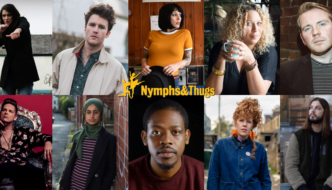
The final evening of Manchester Literature Festival welcomed the return of two highly acclaimed Scottish wordsmiths, and long-standing friends, Jackie Kay and Ali Smith – to deliver a special joint event that investigated the complexities of identity. The contemporaries, whose friendship spans many years, both possess unique and powerful writing styles that come from the tackling of heavy weight content with deft lightness’s of touch.
Jackie Kay, who was reading from Bantam her first collection since her appointment as Scottish Makar, once described herself as an “angry young black lesbian who lost her sense of humour”. The poet and novelist with a highly developed social conscience and a clear fighting spirit was in conversation with Ali Smith, discussing the ways in which literature can be used as an emotive tool to connect with individuals feeling disconnected from identities that have been constructed as societal norms.
Kay, born in 1961 to a Scottish mother and a Nigerian father, was adopted as a baby by a Glaswegian communist couple. Poetry has provided a medium for Kay to explore and document her personal struggles with selfhood. The experience of growing up as a foster child within a white family inspired her first collection, The Adoption Papers (1991). The poems deal with an adopted child’s search for a cultural identity, they are told through three different voices; an adoptive mother, a birth mother and a daughter.
On stage together, Kay and Smith had an incredibly natural rapport, so much so at times it felt as if their dialogue hadn’t broken since afternoon tea – “Anyhoo, shall we just do this forever… my dear fiere how could we not?” The scots enjoyed indulging in colloquial turns of tongue, ‘fiere’ is the old scots word found in the first verse of the ‘Auld Land Syne’ meaning companion, mate or equal. It was clear from Kay and Smith’s brand of gallus humour, and the warm welcoming spirit which the writers emanated that they, and Scots more generally are naturally inclined towards an ethos of hospitality.
The conversation turned to the Scottish referendum and Brexit.
Ali Smith remarked that the sense of inclusion which emerged from the Scots ethos of hospitality maybe hasn’t existed to the same extent in a country that built itself upon empire. After the referendum the Scots had experienced the damages of divisive behaviour, and were wounded by the process. Kay timely reminded us that the majority of Scots voted remain, before reaching for Bantam and reading from her poem, Planet Farage.
“We closed the borders, folks, we nailed it. No trees, no plants, no immigrants No foreign nurses, no doctors; we smashed it. We took control of our affairs. No fresh air.”
It must be noted that Smith and Kay’s aim here was not to pervade the marvels of Scottish values in front of a Manchester crowd. Both Kay and Smith are deeply connected with the northern powerhouse, and clearly feel an affinity towards mancunions. Kay particularly so as she currently lives in the city and occupies the role of chancellor at the University of Salford. The dominant theme of the evening was very much looking to celebrate the wonder of inclusion, and lament the destructiveness of division. Smith exclaimed that “exclusion is the first steps towards a fascist society, and we have to be very aware of the divisions we are being asked to embrace.”
In July 2016 Kay opened the Scottish parliament after the Brexit vote by reading from her poem, Threshold (written specifically for the occasion) where she begins “welcome, welcome to the world’s refugees.” “This is something I couldn’t imagine happening in England,” remarked Smith. “I couldn’t imagine any reference to art or literature in the House of Commons.” Here is an excerpt from the truly brilliant Threshold, which celebrates the marvels of ‘sheer variety’:
“Find here what you are looking for: Democracy, in its infancy: guard her Like you would a small daughter – And keep the door wide open, not just ajar…”
Throughout the evening the writers continued to provide astute political commentary, but with a certain tenderness that installs optimism in the power of connectivity. Smith exclaimed that she sees the job of the writer as one that fills readers with hope not despair – to provide comfort in the knowledge that someone is managing to make sense of it all on our behalf. She began to read four ‘wee’ bits of Winter, the second and latest volume of her seasonal quartet (Autumn, the first of which, was nominated for the 2017 Man Booker Prize).
“Seasons pass, dark times have always turned to light, they just naturally do that.”
Smith turned the focus of conversation towards the ways in which certain technologies have changed how individuals process information. Society is increasingly losing its independence as sources of information come to be defined by frequently searched topics. Google search results tell us what to think. If you type anything into google followed by ‘is’, it is most likely that one of the suggested searches will be ‘….. is dead’. How depressing is that!
Filed under: Written & Spoken Word
Tagged with: Ali Smith, Bantam, Identity, Inclusion, Jackie Kay, literature, novels, poetry, Scotland, Winter



Comments